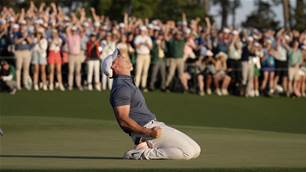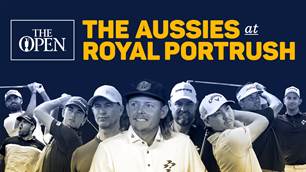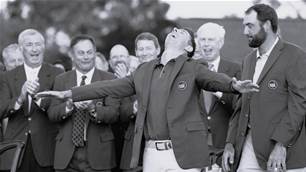Percy Cerutty transformed athletics training and coached a brace of Aussies to sporting immortality.
Percy Cerutty transformed athletics training and coached a brace of Aussies to sporting immortality.
 Cerutty pushed boundaries as his peers looked for pipes and slippers.
Cerutty pushed boundaries as his peers looked for pipes and slippers.Images: Getty Images
Ron Clarke, a 19-time world record-holder, ran the 10,000m at the 1964 Tokyo Olympics with Percy Cerutty’s words stuck in his flesh like goads: “You’ve got no hope, Clarke. You always were a weak bastard.” He took bronze. Cerutty had always wanted to advise Clarke, but was rejected. And so Cerutty turned on Clarke. He believed Clarke had no spirit against spirited men.
Percy Wells Cerutty was all about spirit. He was looked upon as a gadfly: outrageous exhibitionist, eccentric, tactless, merciless, a pest. Of course, he was much more than that. In his own right, he was an extraordinary man considered by almost all who met him to be “ahead of his time”. During the golden age of Australian athletics, in the 1950s and 1960s, he trained the likes of Don Macmillan, Les Perry, Dave Stephens, John Landy and Herb Elliott.
Cerutty believed in the power of reinvention, because he’d personally demonstrated how it could be done. A frail and sickly youth, he’d been little more than a handy athlete himself, but a nervous breakdown in 1938, when he was 43, made him determined to rebuild his mind and body through natural diet and vigorous exercise. Physically, he began to perform feats of endurance that no one would have thought were within his capabilities. Mentally, he exercised his faculties with fanatical reading and note-taking until he developed his philosophy.
Who knows whether this was merely a violent psychological reaction to mortality after so many intimations of it? All we know is that he performed extraordinary deeds at an age when most people were contemplating slippers and a pipe, and delivered a powerful philosophy that impacted on human performance, derived from a universe of sources, from the animal world to the Greek philosophers. His “stotan” (a portmanteau word derived from stoic and spartan) creed was homespun, but it could be no other way. Percy would not have been Percy if he’d operated anywhere inside, or even near, the proverbial square.
From 1942, during his athletic resurrection, Cerutty became dedicated to conditioning himself for intensive running. Competing for the Malvern Harriers, he ran over 100 races, and was responsible for reintroducing the marathon distance to club events; one of his proudest claims was the title of Victorian native marathon champion. He announced himself as a teacher and coach by running 100 miles in 24 hours – an unheard of distance at the time.
As a coach, Cerutty, frankly, was a virus. He got inside his athletes, and they either responded and gained strength, or they folded. The great Herb Elliott was an example of the former. John Landy the latter. But even Landy, who went on to achieve his greatest successes after he left Cerutty, including breaking the four-minute mile seven weeks after Roger Bannister first achieved the feat, had to acknowledge a debt to the little livewire.
Cerutty’s camp in Portsea, on Victoria’s Mornington Peninsula, ostentatiously titled the International Athletics Centre, became legendary – locally and internationally. Thousands came to hear his charismatic homilies, eat raw oats, lift weights, read Plato, poetry and the Bible, run over the gruelling dunes and through ti-tree scrub, learn how to attain near-unattainable goals, and swim naked in the ocean. Those who made the pilgrimage were champions from many sports, including Jimmy Carruthers, Betty Cuthbert and Russell Mockridge. Tom Hafey was a great disciple and as Richmond coach in the 1960s introduced his players to heavy weights and pre-season resistance training as a result of Cerutty’s urging. The premierships followed.
Whether Cerutty should have been able to claim a prodigy like Elliott as one of his successes has always been a matter for debate. Clarke once said that his Mum could have trained Elliott and he’d have been just as great. Elliott himself was unequivocal. “Percy helped me by releasing in my mind and soul a power that I only vaguely thought existed.” Whatever that power was, it enabled Elliott to enter the Presidential Suite of sport’s pantheon, where only the invincible reside. Elliott was unbeaten for his entire career over his pet distance.
Cerutty didn’t see Elliott cross the finish line to win his 1500m gold in Rome, as he was being hauled off the arena by police after attempting to jump a moat to encourage his charge from the side of the track. He was evicted from numerous Olympic and Commonwealth Games villages for his eccentric behaviour.
Cerutty worked on his athletes’ minds, but he also scoured the world of sport for science. He pioneered the incorporation of weight training into runners’ regimes; his promotion of natural diet and instinctive aversion to processed food had him branded a “nut”; he developed annual schedules for runners’ preparation that is today uniformly known as periodisation; he had his runners training in bare feet on soft surfaces (sand, grass) to minimise the risk of impact injuries; he introduced the athletic world to sandhill running as the perfect resistance training – all concepts validated by sports science today. No new theory or idea was introduced without first being tested on himself. He toured the world giving lectures and demonstrations of his original theory of human movement.
He wrote six books and was a captivating speaker and astounding physical specimen up until just a few months before his death in 1975, at 80, from motor neurone disease.
– Robert Drane
Related Articles

Feature Story: Moving the Needle

The Aussies at The Open













